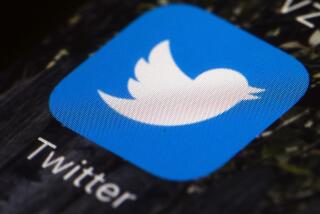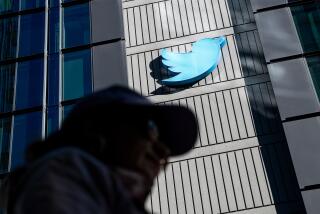Was Twitter right to suspend Guy Adams’ account?
- Share via
Criticism of NBC’s 2012 Olympics coverage has been rampant on Twitter since the Games’ opening ceremony Friday, but Sunday evening, one of the biggest critics found his Twitter account suspended.
Guy Adams, a journalist who’s written about NBC’s coverage, had been tweeting up a storm, which you can see here, presenting NBC in a bad manner. But the last straw finally came when Adams tweeted out the following:
“The man responsible for NBC pretending the Olympics haven’t started yet is Gary Zenkel. Tell him what u think! Email: [email protected]”
Adams was referring to Gary Zenkel, the president of NBC Olympics, and NBC wasn’t having it. The company reported Adams’ tweet, and some time later, Adams’ account was suspended and has stayed down since.
It’s “quite worrying that NBC, whose parent company are an Olympic sponsor, are apparently trying (and, in this case, succeeding) in shutting down the Twitter accounts of journalists who are critical of their Olympic coverage,” Adams wrote to Twitter, according to a piece put online by the Independent on Monday.
But while it can be easy to assume Twitter is just looking out for its Olympic partner, its Terms of Service arguably do appear to back up its actions.
The company states online that “Posting another person’s private and confidential information is a violation of the Twitter Rules.” In another page, Twitter says “If the account is violating our policy, then you can file a report and we will investigate the account. If the account is in violation, we will suspend the account.”
That all seems to support its action, but is a corporate email address considered private information? Well, on that first page, Twitter lists a couple of examples of private information, which include:
- credit card information
- social security or other national identity numbers
- addresses or locations that are considered and treated as private
- non-public, personal phone numbers
- non-public, personal email addresses
There’s no mention of corporate or professional emails, and Deadspin, which has been reporting the story, says the emails of NBC executives are easy to determine since they’re all a basic “[email protected]” format.
But in its Terms of Service, Twitter alludes that information is considered private if it isn’t listed online, and from what I could find, Zenkel’s email was not public prior to Monday.
[Updated, 4:20 p.m. July 30: A reader pointed out this Web page dated June 2011 that lists Zenkel’s email. It’s not a prominent website, but it does list Zenkel’s email, which now seems to tilt the argument Adams’ way.]
Twitter has declined to comment, saying its policy is not to comment about individual users. And I haven’t been able to reach Adams for further comment on his part, but it may not be long before Adams’ Twitter account is back up because Twitter has told him he simply needs to confirm that he has read and understands Twitter’s policy.
Regardless, Adams is right about his suspension being worrying.
It’s not that the suspension is all that bad. Twitter suspends accounts every day, but the fact that this suspension is more of a judgment call than an exact science is disturbing.
Twitter and NBC are partners, and friends tend to watch each others’ backs. So if you have been criticizing NBC and plan to continue doing so, it may be best to make sure you aren’t violating Twitter’s policies -- you don’t want to find your account down the next time you try to log on.
ALSO:
Is it time to declare the death of the iPod?
Jury selection begins in Apple vs. Samsung trial
Apple sued by Taiwanese university for Siri patent infringement
Follow Salvador Rodriguez on Facebook, Twitter or Google+
More to Read
Inside the business of entertainment
The Wide Shot brings you news, analysis and insights on everything from streaming wars to production — and what it all means for the future.
You may occasionally receive promotional content from the Los Angeles Times.











